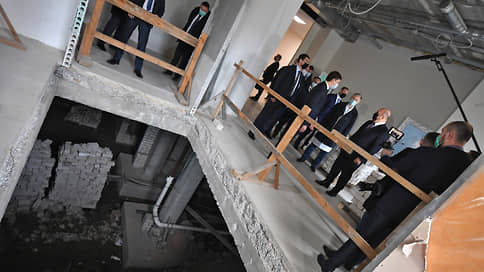Federalization of long-term construction – Newspaper Kommersant No. 177 (7378) dated 09/26/2022
[ad_1]

The government is now considering at a practical level the issue of transferring the completion of the construction of a number of socially significant long-term construction projects in the regions to the federal level. If this decision is made, the functions of the state customer for such facilities may be transferred to the Single Customer PPC or subordinate organizations of the Ministry of Construction. According to Kommersant, the list of high-priority long-term construction includes 11 facilities, including hospitals in Orel, Tver, Stavropol and Komsomolsk-on-Amur, the total cost of the facilities on this list is at least 24 billion rubles.
According to Kommersant, the White House returned to the idea of completing the construction of a number of socially significant facilities in the regions by transferring long-term construction projects co-financed by the federal budget to the federal level from the regional one. Recall that long-term construction in the social sphere has been discussed by the federal authorities for many years, while almost every visit of Prime Minister Mikhail Mishustin to the regions in the past three years contains visits to such facilities, and the heads of regions always publicly confirm their readiness to complete them for specific deadlines.
Now the government is discussing three options for the “federalization” of construction projects, promises to complete which in the standard mode by the regions, most likely, cannot be fulfilled. They were also discussed earlier at the Presidium of the State Council for Housing and Public Utilities. In the first option, where we are talking only about regional facilities co-financed by the federal center, it is assumed that the function of the technical customer of the facility, by agreement with the region, will be transferred to the subordinate structure of the Ministry of Construction, for example, FAA Roskapstroy. In the second option, the region can conclude an agreement with the public-law company (PPK) “Single Customer” to transfer the functions of a state customer, and not a technical customer, to it, this will require changes to Law 435-FZ (which the White House is ready for) and Art. . 79 of the Budget Code, if we are talking about a municipal facility. Finally, by analogy with the projects of the Olimpstroy Group of Companies, the Single Customer PPK can build municipal facilities by decision of the Russian government.
The list of priority problematic social facilities, which is being discussed in the government, includes 11 regional long-term construction projects, the total cost of which in the prices of the years in which the projects were approved is just over 24 billion rubles. The most expensive objects on the list are the medical center of the regional hospital in Orel, children’s clinics in Tver, Stavropol and Komsomolsk-on-Amur, the oncology center in Tomsk, a social town in the Pskov region (Baranovichi), runway coverage at Yaroslavl airport Tunoshna.
Deputy Chairman of the Federation Council Galina Karelova considers the proposed mechanism for the transfer of regional long-term construction projects to the federal level effective and necessary. “This is especially true for the construction of hospitals in regions where it is necessary to quickly solve the problem of increasing the availability and quality of medical services,” she notes. According to her, in a number of regions the terms for the development of design and estimate documentation of the required quality are delayed, possibly due to a lack of qualified specialists. Andrey Shevchenko, head of the Federation Council Committee on Federal Structure and Regional Policy, also considers the decision overdue: “The level of competencies in the construction industry is growing, but we already have a critical scale of unfinished construction, and this is budget money and unfulfilled social obligations.”
In the construction industry, the amendments are also supported. Aleksey Vorontsov, head of the NOPRIZ Committee for Architecture and Construction, points out the problems of low quality of design documentation due to the pricing policy and, as a result, the participation of weak survey and design teams in tenders and tenders. “As a result, low quality, a significant increase in cost and an increase in construction time. If the economy interferes with the fulfillment of social obligations, the state is obliged to take responsibility and work on itself. Therefore, it is necessary to transfer to a single state customer the work to complete the construction and commissioning of such facilities,” he notes.
[ad_2]
Source link






